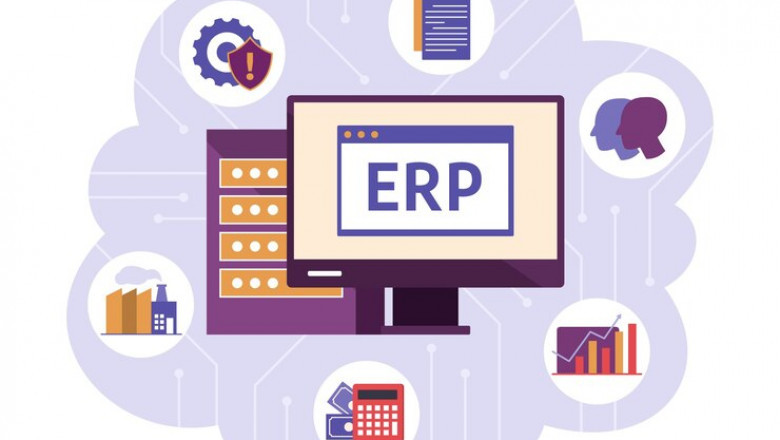views
Introduction
In Dubai's fast-paced business environment, implementing an ERP system in Dubai has become a necessity rather than a luxury. With the city's vision to become a global smart economy, companies across industries are leveraging Enterprise Resource Planning (ERP) solutions to streamline operations, enhance efficiency, and maintain competitive advantage.
But what is an ERP system, and why is it crucial for businesses in Dubai? This comprehensive guide will explore:
✔ The fundamentals of ERP technology
✔ Key benefits for Dubai-based businesses
✔ Implementation strategies for success
✔ Future trends shaping the ERP landscape
By the end, you'll understand how an ERP system can transform your business operations in Dubai's dynamic market.
What Is an ERP System?
Defining Enterprise Resource Planning
An ERP system is an integrated software platform that connects and automates core business processes across an organization. It serves as a centralized hub for managing:
-
Finance & Accounting
-
Supply Chain & Inventory
-
Human Resources
-
Customer Relationship Management (CRM)
-
Manufacturing & Production
How ERP Systems Work
Modern ERP solutions consolidate data from different departments into a single database, providing:
-
Real-time visibility across operations
-
Automated workflows to replace manual processes
-
Data-driven insights for strategic decision-making
The Evolution of ERP Technology
| Generation | Key Characteristics |
|---|---|
| 1960s-70s | Inventory Control Systems |
| 1980s | Material Requirements Planning (MRP) |
| 1990s | Client-Server ERP Solutions |
| 2000s | Web-Based Applications |
| Present | Cloud-Based, AI-Powered ERP |
Why Dubai Businesses Need ERP Systems
1. Streamlining Multi-Department Operations
Dubai's diverse economy requires businesses to manage:
-
International supply chains
-
Multi-currency transactions
-
Complex regulatory requirements
An ERP system in Dubai breaks down silos between departments for seamless operations.
2. Compliance with UAE Regulations
Key compliance features include:
-
Automated VAT calculations and reporting
-
WPS (Wage Protection System) integration
-
Emiratization tracking
3. Enhancing Customer Experiences
ERP systems enable:
-
360° customer views through CRM integration
-
Faster order processing and delivery tracking
-
Personalized service through data analytics
4. Data-Driven Decision Making
With real-time dashboards showing:
-
Financial performance
-
Inventory levels
-
Sales trends
5. Cost Reduction and Efficiency
Typical savings include:
-
20-30% reduction in operational costs
-
40-50% faster financial reporting
-
25% improvement in inventory turnover
Key Features of Modern ERP System in Dubai
1. Cloud-Based Deployment
-
Accessible from anywhere with internet
-
Automatic software updates
-
Lower upfront costs
2. Arabic Language Support
-
Localized interfaces
-
Arabic/English bilingual capabilities
3. UAE-Specific Compliance Tools
-
VAT automation (FTA-approved)
-
WPS payroll integration
-
Golden Visa program tracking
4. Industry-Specific Modules
-
Retail: POS and omnichannel integration
-
Construction: Project cost tracking
-
Healthcare: Patient management
5. Mobile Accessibility
-
Approval workflows on smartphones
-
Real-time inventory checks
Top 5 ERP Systems for Dubai Businesses
1. SAP S/4HANA
✅ Best for: Large enterprises
✅ Dubai Advantage: Local compliance, Arabic support
2. Oracle NetSuite
✅ Best for: Growing businesses
✅ Dubai Advantage: Cloud-based, multi-currency
3. Microsoft Dynamics 365
✅ Best for: Microsoft ecosystem users
✅ Dubai Advantage: Power BI integration
4. Odoo
✅ Best for: SMEs
✅ Dubai Advantage: Affordable modular pricing
5. Zoho ERP
✅ Best for: Startups
✅ Dubai Advantage: Easy-to-use interface
Implementing an ERP System in Dubai: Step-by-Step
1. Needs Assessment
-
Identify pain points
-
Define must-have features
2. Vendor Selection
-
Evaluate local support capabilities
-
Check UAE customer references
3. Data Migration
-
Cleanse existing data
-
Map to new system structure
4. User Training
-
Department-specific sessions
-
Ongoing support
5. Go-Live and Optimization
-
Parallel run with old systems
-
Continuous improvement
Future of ERP in Dubai
Emerging trends include:
-
AI-powered forecasting for demand planning
-
Blockchain integration for secure transactions
-
IoT connectivity for asset tracking
-
Voice-enabled ERP for hands-free operations
Conclusion
Implementing an ERP system in Dubai is no longer optional for businesses seeking to maintain competitiveness. These systems provide:
✔ Unified operations across locations
✔ Compliance with UAE regulations
✔ Data-driven decision making
✔ Significant cost savings
Whether you're a startup or enterprise, the right ERP solution can transform your business operations in Dubai's dynamic market.
FAQs About ERP Systems
1. What's the difference between ERP and accounting software?
Accounting software handles only financials, while ERP integrates all business functions including HR, inventory, and CRM.
2. How long does ERP implementation take in Dubai?
Typically 3-12 months depending on business size and complexity.
3. Can ERP software handle UAE VAT compliance?
Yes, top solutions like SAP and Oracle include FTA-approved VAT modules.
4. What's the average cost of ERP software in Dubai?
-
SMEs: AED 15,000 - 50,000 annually
-
Enterprises: AED 100,000+
5. Is cloud ERP secure for sensitive business data?
Reputable providers use enterprise-grade security with UAE data centers.














Comments
0 comment